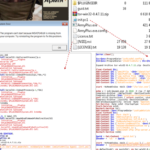In their final meeting, China’s leader Xi Jinping told President Biden that his nation was “ready to work with a new administration,” as President-elect Donald Trump prepares to take over.
The two leaders gathered Saturday on the sidelines of the annual Asia-Pacific Economic Cooperation summit. Biden was expected to urge Xi to dissuade on .
Without mentioning Trump’s name, Xi appeared to signal his concern that the incoming president’s protectionist rhetoric on the campaign trail could send the U.S.-China relationship into another valley.
“China is ready to work with a new U.S. administration to maintain communication, expand cooperation and manage differences so as to strive for a steady transition of the China-U.S. relationship for the benefit of the two peoples,” Xi said through an interpreter.
Biden, meanwhile, spoke in broader brushstrokes, reflecting not just on the last four years, but on the long relationship.
”Over the past four years, China-U.S. relations have experienced ups and downs, but with the two of us at the helm, we have also engaged in fruitful dialogues and cooperation, and generally achieved stability,” he said.
Biden and Xi, with top aides surrounding them, gathered around a long rectangle of tables in an expansive conference room at Lima’s Defines Hotel and Conference Center.
There’s much uncertainty about what lies ahead in the U.S.-China relationship under Trump, who campaigned promising to levy 60% tariffs on Chinese imports.
Already, many American companies, including Nike and eyewear retailer Warby Parker, have been diversifying their sourcing away from China. Shoe brand Steve Madden says it plans to cut imports from China by as much as 45% next year.
White House national security advisor Jake Sullivan said Biden administration officials will advise the Trump team that managing the intense competition with Beijing will likely be the most significant foreign policy challenge they will face.
It’s a big moment for Biden as he wraps up more than 50 years in politics. He saw his relationship with Xi as among the most consequential on the international stage and put much effort into cultivating that relationship.
Biden and Xi first got to know each other on travels across the U.S. and China when both were vice presidents, interactions that both have said left a lasting impression.
“For over a decade, you and I have spent many hours together, both here and in China and in between. And I think we’ve spent a long time dealing with these issues,” Biden said Saturday.
But the last four years have presented a steady stream of difficult moments.
The FBI has offered new details of a federal investigation into Chinese government efforts to hack into U.S. telecommunications networks. The initial findings have revealed a “broad and significant” cyber-espionage campaign aimed at stealing information from Americans who work in government and politics.
U.S. intelligence officials also have assessed China has surged sales to Russia of machine tools, microelectronics and other technology that Moscow is using to produce missiles, tanks, aircraft and other weaponry for use in its war against Ukraine.
And tensions flared last year after Biden ordered the shooting down of a Chinese spy balloon that traversed the United States.
White House officials also have expressed frustration with Beijing, which accounts for the vast majority of North Korea’s trade, for not doing more to rein in Pyongyang.
The North Koreans also have provided Russia with artillery and other munitions, according to U.S. and South Korean intelligence officials. And the U.S., Japan and South Korea have expressed alarm over Pyongyang’s stepped-up cadence of ballistic missile tests.
Madhani writes for the Associated Press. AP writer Mari Yamaguchi in Tokyo contributed to this report.










